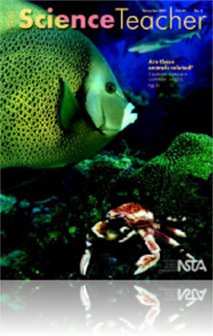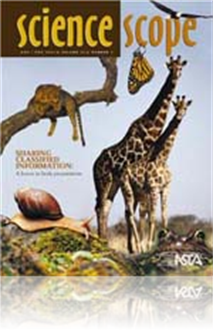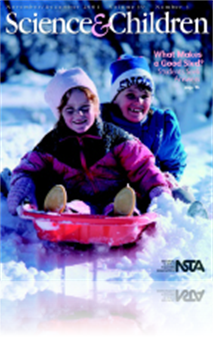All Resources
Journal Article
Design Technology: Children’s Engineering (Dunn and Larson 1990), is a learning model that allows children to experience developmentally appropriate, hands-on instructional methods that enable them to draw, plan, design, build, test, and improve th...
Journal Article
Using the Past in Class: Learning from historical models of cell membranes
Studying the history of science shows students how science is a process that occurs over time. A sample lesson in which secondary life science students examine the history of the development of the cell membrane model is included. After discussing th...
Journal Article
An opinion piece about the concerns highlighted at the Town Meeting at the 2001 NSTA Convention. ...
Journal Article
Quicksand Query: Using a popular fallacy to teach about density and volume
A popular misconception—quicksand sucks people under—is used to teach students about density. In a series of lab activities, students create quicksand, determine its density, and measure the density of water and irregular objects. Students learn ...
Journal Article
Tech Trek: Flash forward to problem-based science
Read about The Reconstructors, a website designed to combine aspects of problem-based learning and science standards and deliver them over the Web via interesting multimedia....
Journal Article
Comparing Common Origins: Using biotechnology to teach evolution
The field of biotechnology creates exciting new pathways for students to engage in scientific inquiry. In this article, secondary biology students use protein electrophoresis and online genetic and taxonomic databases to study evolution and biotechno...
Journal Article
Learning to Remember: Building memory cues into a geology lesson
Current neuroscience and psychology research has tremendously affected what we know about how people learn. Recent insights into the brain’s natural tendencies can help educators align strategies and activities to maximize student learning. Knowing...
Journal Article
Analogies, or comparisons based on similarities between things that are otherwise dissimilar, can greatly enhance science learning for children. Analogous reasoning “is a central component of human cognition. It is involved in classification and in...
Journal Article
Note Sheets: A Reliable Predictor of Success?
Students in a large introductory-level biology course brought one page of notes to their exams. The authors scored these note sheets for their format and content. Student performance on exams showed a very limited correlation with the format or conte...
Journal Article
Teachers can engage their students in lively presentations that demonstrate their understanding of biological classification. Using a cooperative learning approach, student groups research and apply their knowledge of each level of classification thr...
Journal Article
Editor's Note (November/December 2001)
Science and Children’s editor shares thoughts about the horror of September 11, 2001, and its immediate effect on children in classrooms and its effect on what should happen in our classrooms now and in the future....
Journal Article
Soil Studies: Applying acid-base chemistry to environmental analysis
To help secondary students understand acid-base chemistry, two educators design experiments focusing on acid rain’s effect on soil. Students conduct experiments to measure the pH of rainwater and soil before and after rainwater has filtered through...
Journal Article
Astrobiology: Discovering New Worlds of Life
This article describes the fascinating new field of astrobiology—a multidisciplinary approach in which scientists apply their knowledge of deep-sea environments to examine the origin of life on Earth and determine the possibility of extraterrestria...
Journal Article
Alternative Assessment: A monthly portfolio project improves student performance
As an alternative method of assessment, students create portfolios by submitting monthly entries that demonstrate and expand their understanding of science concepts. Teachers can also use the portfolios to assess the success of their teaching practic...









